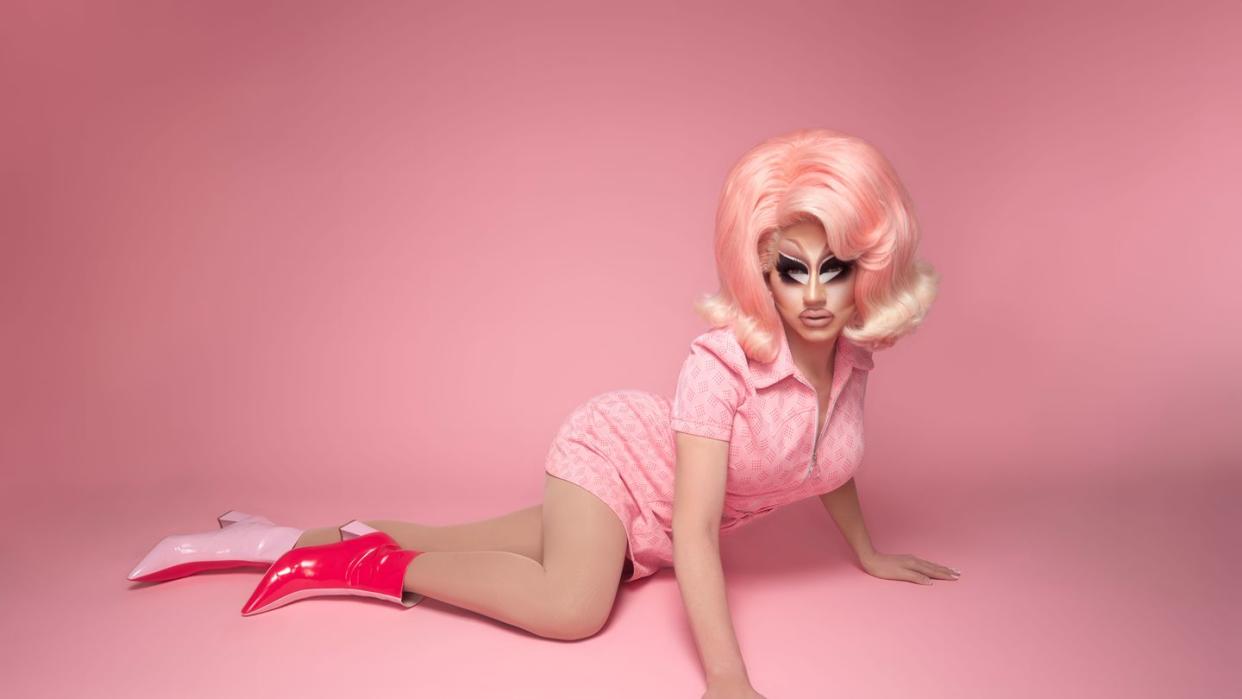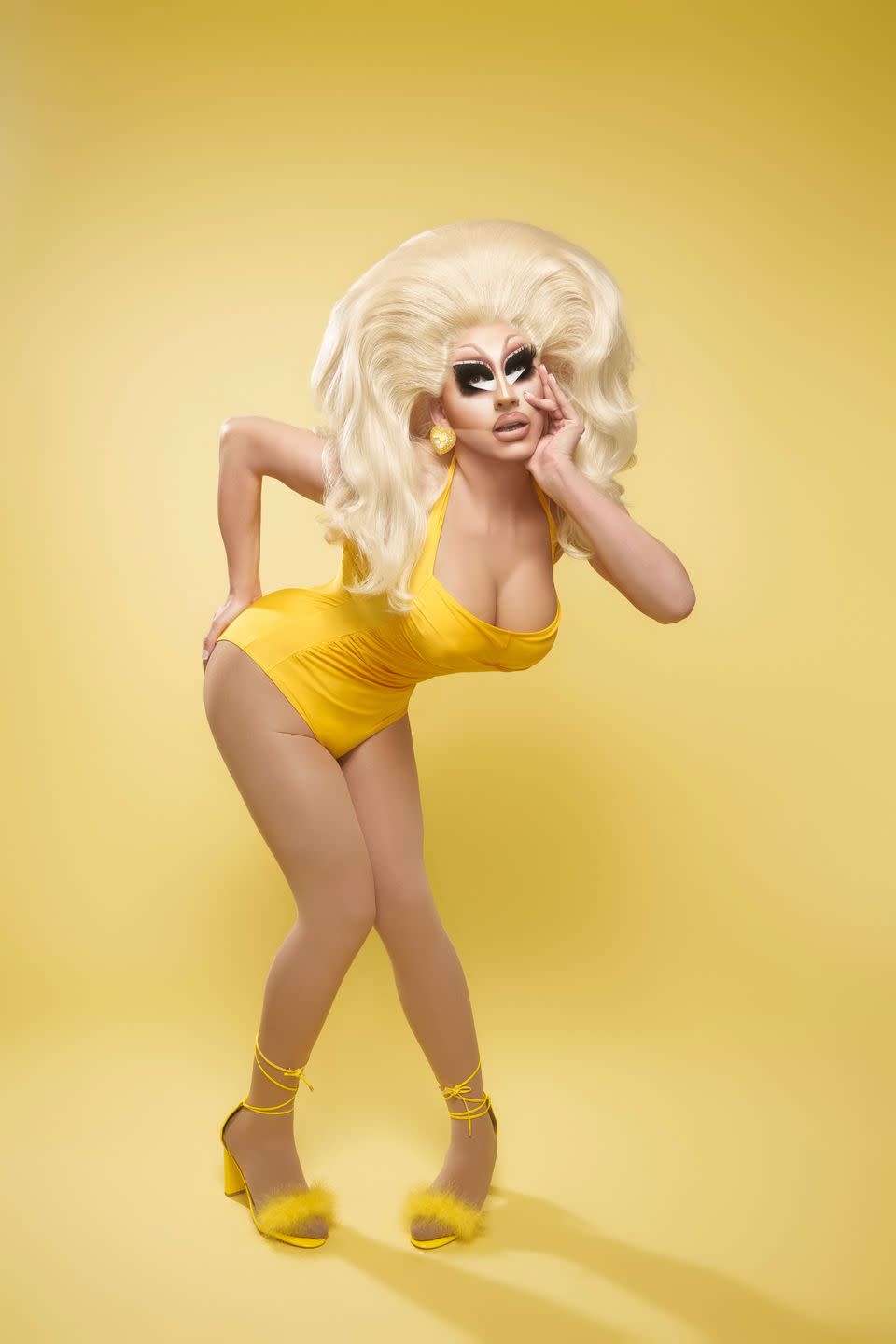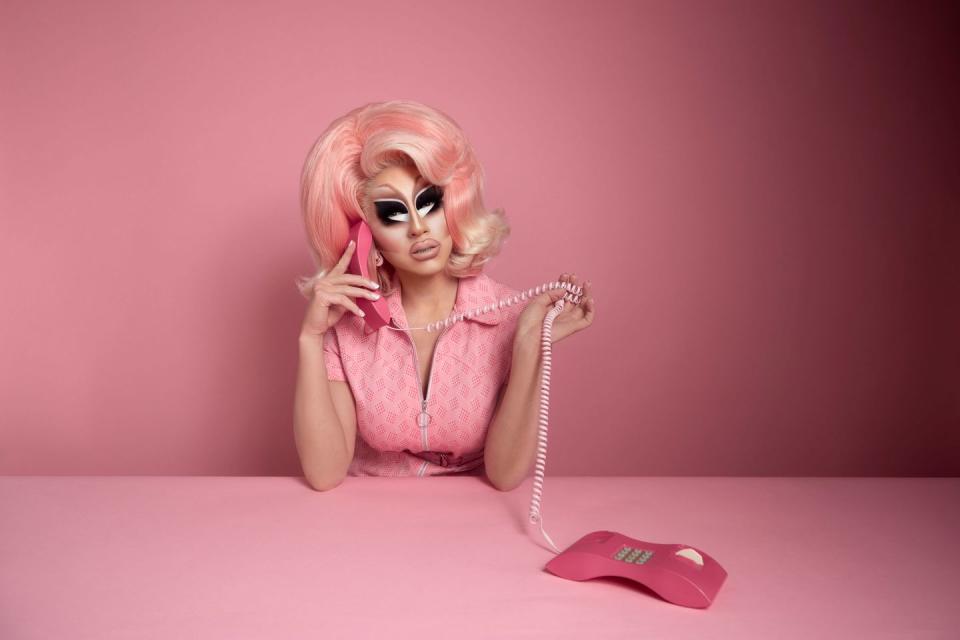Trixie Mattel’s Going to Take a Break—But Not Just Yet

While most commoners’ Pride months are filled with parades, drinking, and rainbow memorabilia, for drag performers, the month of June can be quite the marathon. It’s all about the gigs and looks, the bookings and boys. It may be cliché, but to quote Lady Gaga, it literally is, “No sleep, bus, club, another club, another club, another club, another club, plane, next place.”
For Trixie Mattel, it’s felt like Pride since 2015. First gaining attention for her turn on season 7 of RuPaul’s Drag Race where she placed sixth, the superstar used that moment as a launch pad. She has since won season 3 of RuPaul’s Drag Race All Stars, become a YouTube darling, judged Queen of the Universe on Paramount+, and most recently premiered Trixie Motel: Drag Me Home premiere on Max. She’s released music, is a successful DJ and podcast host, and has a makeup company. She’s the Jennifer Hudson of Drag Race, taking a non-winning finish and milking it for all it’s worth. (EGOT for Trixie when?)
“Kelly Clarkson probably could still be Kelly Clarkson if she hadn’t won,” Mattel says. “Winning is a bonus, and I say that as somebody who’s won as well. Drag, for me, has never been about waiting for other people to tell me when it’s my moment. It’s never been about waiting for other people to give me my chair or my flowers and say, now you’re the star. I’ve never felt like I needed that validation. I just always believed in myself.”
Below, Trixie discusses the new season of Trixie Motel, a brand new Pride video with YouTube, her upcoming break from drag, and how the art form has evolved and changed.
You’ve come so far since your first season of Drag Race. When you look back, what do you wish you could have told Trixie during that season. What did you need to learn still?
I always thought Trixie was very marketable and cool and had mass appeal. I just really believed in myself, even if my skill set maybe wasn’t there. When you lose Drag Race, there’s a moment RuPaul says to you that you are not America’s next drag superstar. I’m just delusional enough that I thought that has nothing to do with me. One person’s idea of me is [just] one person’s idea of me. It doesn’t matter who it is.
I really was there to compete, but I hadn’t really even conceptualized what I could do with it, because everything I’ve gotten “successful” for as Trixie is self-made projects or my records, where I write all the music and play the guitar and sing it, or my DJ tours where I make the visuals and DJ and do the makeup. I’m still on tour doing all my own hair and everything. I feel like I just took the back door through everything. In the beginning, I was the only one who saw the potential, but I really didn’t let that bother me.
I was like, I’m really about to smoke all of you. I’m funny. I can sing, I can dance. I can tell jokes. I look great. I love business. That’s the thing. I think a lot of artists feel like if you’re interested in the business half of it, you’re kind of a sell-out. And maybe that’s true, but I have always found the sales part of showbusiness very artistically stimulating and rewarding. I love selling things. That’s fun for me. It’s like a little game.
That speaks a lot to your grit and drive.
My house was really built brick by brick, and for a long time it was just me. For most gigs, I was often selling my own merchandise. I remember when Violet [Chachki] won Drag Race, she was doing an aerial number with her crown on and spinning. I was standing in the back of the room with a suitcase out of drag selling Trixie shirts. I’ve never been afraid of the industry half of drag. I always knew that I was willing to get up earlier and stay later and work harder than other drag queens.
In a world with nepo babies, I came from nothing. I was [from] the poorest family in a small town. I grew up in a trailer with six people. My expectations for what I could do for myself were so low, because even when I went to college and got my first job, I felt rich. I felt so successful that I could pay my bills. When I was lip-syncing at Hamburger Mary’s Milwaukee, the fact that I could pay my bills, pay my rent doing drag, I felt like Beyoncé. I never expected to keep going. I save all my money, because I always think this probably will go away. If I want to quit someday, I will quit, and I’ll quit with a lot of dignity because I did it all.

You really have done it all, too. How do you maintain this energy? Do you just live off of Red Bull and Five Hour Energy?
I can’t really do it anymore. I’m going on a three or four month sabbatical: July, August, September, and October. I’m not even doing social media, so I’m going to really be gone for a while.
I’m probably not going to come back at the full speed of Trixie anymore. The Trixie we know, the Trixie that is on every YouTube video, on every show, and every TV show, I just can’t sustain that anymore. This giant rat wheel that I’ve been running on, I need to pull back a lot. So it will be honestly this phase of everybody being like, “You’re everywhere. How do you do it?” You do it by running yourself in the ground. I want a family, and I want a life, and I haven’t really had that. I’ll probably grow a beard. Besides, the other drag queens have been waiting for me to take my high heel off their throats for years. They love it when I get a sick day. Those fucking bitches love it when I get sick. They love it.
The second season of Trixie Motel just dropped on Max called Trixie Motel: Drag Me Home. What interested you about the hospitality space?
For me it was a return to the hospitality space. My first job at 13 was scooping ice cream at a place called Lickety Split, and then I worked at a chicken restaurant. Then I was a cocktail server, and then I worked at a sub sandwich store, and then I was a barback. I’ve had all of the hospitality jobs. I feel like I am not a normal celebrity business owner.
I’m not like a normal celebrity makeup company. I worked six years behind a makeup counter, so I feel very in touch with these things. I’ve been to every gay bar and motel on the planet at this point, so I just thought I know what makes a good hotel experience and I know what makes a great clear special, magical nightlife experience.
Why Palm Springs?
Palm Springs is a lot like Trixie. It’s super sixties, super California, super Americana, and it’s frozen in time. Trixie really matches the Palm Springs vibe. Trixie belongs here. So it just worked out. Could you imagine the Trixie Hotel in the middle of Los Angeles? It would kind of look like a tourist trap, but in Palm Springs it fits right in.
You recently filmed a pride video with YouTube about the history of drag. What excited you about this video and filming with Juno Birch?
I love working with Juno, we’re the secret drag queens of YouTube. Drag’s gotten so big in the past decade. When I started getting really into house music, I felt a duty to go learn everything I could about how house music happened. I think with drag, the drag as we know it has only been this way for a decade. It’s cool to look at how this became this, became this. It’s like the cover of one of those Animorphs books or the evolution of woman. It’s very cool.
In the video, you talk about the definition of drag and how that’s changed and evolved. How would you define drag now?
I have a loose interpretation of drag because to me, my drag icons were RuPaul, Elvira, Kiwi. I love character actors, specifically when they play with gender. I don’t even have a good definition of it because honestly. It’s always growing and changing. I mean, even with Trixie, I don’t really think of myself as the drag industry. I think of myself as the Trixie Mattel industry. The rest of these hoes, their brand is drag and my brand is Trixie.
My goal with Trixie was to originally create a character that I could use to critique Americanized beauty and celebrity because Trixie is thin, rich, stupid, and blonde. She originally had blue eyes. She’s hyper sexualized, capitalistic, self-indulgent, horny, and ultimately like a B-minus person. I always meant for Trixie to caricature the worst parts of Americanized Caucasian beauty and wealth. For Trixie, I think it’s always about money, and it’s always about, “How good do I look? How does my butt look in this? How much money are we making today? But can we bring the focus back to me?” I wanted to create a character that was a little bit like Michael Scott or something from The Office, where it’s like he’s not a bad person, but he doesn’t always have the tools to be a good person in the moment. I always think of Trixie as a heart of gold that we only see circumstantially. I just thought a character based on kid’s toys was a great vehicle to do that, because my sense of humor is so dark. I think the look of the character being kind of Toys“R”Us lightens the load a little bit.
Why is YouTube important to you as a platform?
I love the freedom of it. I love just sitting in my house and coming up with an idea for a video and then stepping in and screaming. It’s everything I love about TV without all the emails. We just get an idea, do it, have fun with it, and release it. So much of TV and so much of film is waiting for 10 straight white guys above you to sign a piece of paper saying you can do this. On YouTube, there’s so much freedom. You can just get a dumb idea as an independent artist and go make it today. It’s just our TV station.
Do you read the comments and ever take that feedback?
I read the comments, but I certainly don’t take feedback. I think it’s a really slippery slope to start chiseling away at your content to shape it the way people who don’t like you want it to be. The people who like you are the ones you should really make something for. Positive comments mean so much more to me. A comment is basically, “This was my experience with this,” “My experience made me think this,” or whatever.

Where does Trixie end and your life begin? Do you view every time you put on drag as getting into character?
I do. I know in Trixie Motel and stuff, you see me in drag and you see me out of drag. But when I’m in drag, I really feel like a completely different person. I walk different, I talk different. My sense of humor is different. I’m flirty and loud and cutting and very dry and obnoxious. I think out of drag, I’m really just an introvert.
This interview has been edited and condensed for clarity.
You Might Also Like

 Yahoo News
Yahoo News 
